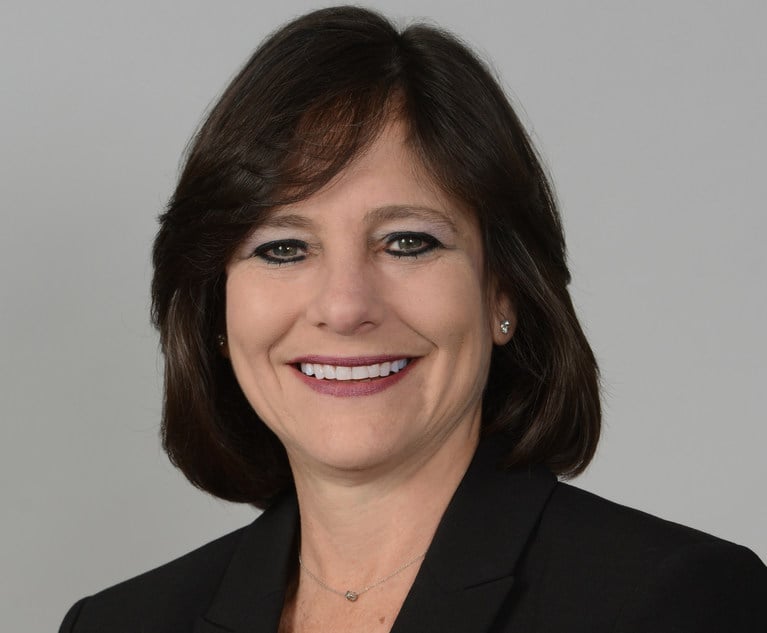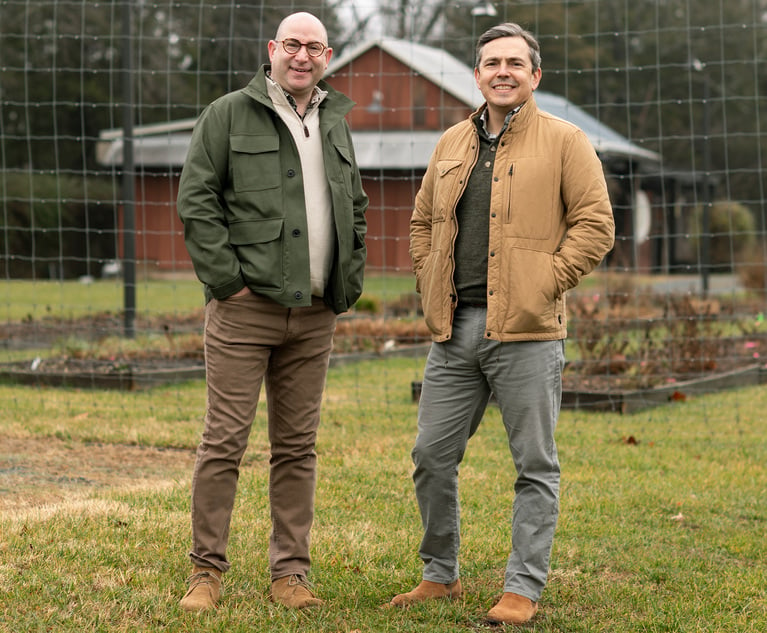 Judge Richard Dietz , North Carolina Court of Appeals with Judge Phil Berger and Patrick Bailey during a month-long remote WebEx appellate seminar aimed at providing students with a meaningful summer internship experience. (Photo: Courtesy Photo)
Judge Richard Dietz , North Carolina Court of Appeals with Judge Phil Berger and Patrick Bailey during a month-long remote WebEx appellate seminar aimed at providing students with a meaningful summer internship experience. (Photo: Courtesy Photo)A Lost Summer for Law Students? Not For Aspiring Appellate Lawyers in NC and the OC
The Orange County Bar Association is set to launch an online appellate academy this week after the North Carolina Court of Appeals wrapped their own summer appellate seminar for law students early this month.
July 14, 2020 at 08:33 PM
5 minute read
During a normal summer, Judge Philip Berger Jr. of the North Carolina Court of Appeals puts together a program for the law students who spend time between semesters interning for the court's 15 judges. In something of a soup to nuts course on how state law is made and interpreted in the Tar Heel State, the interns usually meet with the state attorney general, lawyers with the public defender's office, as well as lawyers for the governor and state legislature.
Well, needless to say, this has not been a normal summer in Raleigh, or anywhere else, really.
But Berger and his colleague Judge Richard Dietz didn't want to leave gaping holes in the resumes of all the interns missing the experience working for the court this summer. In May while continuing their work deciding cases and writing opinions by day, the pair began to swiftly pull together a summer appellate seminar covering the basics on topics including appellate practice and procedure, statutory interpretation, and legal writing during their evenings. While putting together the seminar for the interns, the pair saw an outpouring of disappointment from aspiring lawyers and new graduates on Twitter and LinkedIn about summer plans being deferred or, worse yet, cancelled.
"We thought 'If we're going to put something together and it's all remote, why just limit it to the students we were planning to bring in as our interns?'" said Dietz, of the decision to open the free online program the judges cooked up first to all students at North Carolina law schools and then to any aspiring lawyer aiming to practice appellate law in the state.
Dietz, 43, was a partner in the appellate & Supreme Court team at Kilpatrick Townsend & Stockton prior to being nominated to a vacant seat on the intermediate North Carolina appellate bench in 2014 and retained for an eight-year term by voters two years later. He graduated law school himself as the dot-com bubble was bursting and did research on the implications of Enron's collapse and the ensuing passage of Sarbanes-Oxley Act while a research fellow in comparative law at Kyushu University in Japan. Having also lived through the recession of the last decade, Dietz says he has a soft spot for lawyers whose formative years in the profession are met with limited opportunities.
Dietz and Berger put together their curriculum and reached out to North Carolina law schools in May, rolled it out in June, and finished earlier this month. The program, which has lectures and materials available now online, drew about 200 new and aspiring North Carolina lawyers, about 150 of whom viewed all seven 50-minute lectures and participated in three break-out small group Webex sessions that were limited to up to 15 participants. Those that finished the seminar are set to get a certificate for the court, but Dietz told participants in his final lecture that they should be prepared to explain exactly what they picked up in the program since potential employers are unlikely to have heard of it.
Across the country in California, the North Carolina program caught the attention of Haynes and Boone appellate co-chair Mary-Christine "M.C." Sungaila, a member of the Orange County Bar Association Board of Directors and a member of its COVID-19 task force, which has been organizing two free webinars per week for members since mid-March.
"When I saw this, I thought, 'We haven't done something for law students and our law student members,'" Sungaila said.
Sungaila helped pull together a team of faculty including legal writing expert Ross Guberman, Loyola Law School Professor Paula Mitchell who directs the school's Ninth Circuit appellate clinic, former Court of Appeal Justice and founder of the Grignon Law Firm Margaret Grignon, Orange County Superior Court Judge Kimberly Knill to teach a free four-part summer academy on appellate law via webinar for the bar association's law student members. The academy, set to begin on Friday, July 17, is set to cover topics such as brief writing, oral argument, and jobs in appellate law.
"I'm interested in getting the next generation of lawyers who might be interested in appellate exposure to it," Sungaila said. She said she's also hoping to give students and new lawyers something of use in a moment when things such as job prospects and even their ability to take the bar exam are in flux.
Dietz said that he hopes that other courts and bar associations will look at the materials his court has online from its seminar and make their own effort to give aspiring lawyers useful experience during this otherwise "gloomy" time.
"There's still time in the summer," Dietz said. "So if people want to try to put something together, it's not too late."
This content has been archived. It is available through our partners, LexisNexis® and Bloomberg Law.
To view this content, please continue to their sites.
Not a Lexis Subscriber?
Subscribe Now
Not a Bloomberg Law Subscriber?
Subscribe Now
NOT FOR REPRINT
© 2025 ALM Global, LLC, All Rights Reserved. Request academic re-use from www.copyright.com. All other uses, submit a request to [email protected]. For more information visit Asset & Logo Licensing.
You Might Like
View All
Litigation Leaders: Jason Leckerman of Ballard Spahr on Growing the Department by a Third Via Merger with Lane Powell

Litigation Leaders: Greenspoon Marder’s Beth-Ann Krimsky on What Makes Her Team ‘Prepared, Compassionate and Wicked Smart’

Why the Founders of IP Boutique Fisch Sigler Are Stepping Away From the Law and Starting an AI Venture
Law Firms Mentioned
Trending Stories
- 1Hogan Lovells Focuses on Corporate and Finance for 2025 Partner Promotions
- 2What I Wish I Knew Then: Richard Esposito
- 3In First Appeal of 2025, NY Top Court Eyes Ethics Watchdog, Cuomo's Book Deal
- 4Ex-Jenkens & Gilchrist Lawyer Convicted in Tax Shelter Scheme is Among Biden's Commutations
- 5Corporate Disclosure Law Enjoys ‘Presumption of Constitutionality,’ Feds Tell Justices
Who Got The Work
Michael G. Bongiorno, Andrew Scott Dulberg and Elizabeth E. Driscoll from Wilmer Cutler Pickering Hale and Dorr have stepped in to represent Symbotic Inc., an A.I.-enabled technology platform that focuses on increasing supply chain efficiency, and other defendants in a pending shareholder derivative lawsuit. The case, filed Oct. 2 in Massachusetts District Court by the Brown Law Firm on behalf of Stephen Austen, accuses certain officers and directors of misleading investors in regard to Symbotic's potential for margin growth by failing to disclose that the company was not equipped to timely deploy its systems or manage expenses through project delays. The case, assigned to U.S. District Judge Nathaniel M. Gorton, is 1:24-cv-12522, Austen v. Cohen et al.
Who Got The Work
Edmund Polubinski and Marie Killmond of Davis Polk & Wardwell have entered appearances for data platform software development company MongoDB and other defendants in a pending shareholder derivative lawsuit. The action, filed Oct. 7 in New York Southern District Court by the Brown Law Firm, accuses the company's directors and/or officers of falsely expressing confidence in the company’s restructuring of its sales incentive plan and downplaying the severity of decreases in its upfront commitments. The case is 1:24-cv-07594, Roy v. Ittycheria et al.
Who Got The Work
Amy O. Bruchs and Kurt F. Ellison of Michael Best & Friedrich have entered appearances for Epic Systems Corp. in a pending employment discrimination lawsuit. The suit was filed Sept. 7 in Wisconsin Western District Court by Levine Eisberner LLC and Siri & Glimstad on behalf of a project manager who claims that he was wrongfully terminated after applying for a religious exemption to the defendant's COVID-19 vaccine mandate. The case, assigned to U.S. Magistrate Judge Anita Marie Boor, is 3:24-cv-00630, Secker, Nathan v. Epic Systems Corporation.
Who Got The Work
David X. Sullivan, Thomas J. Finn and Gregory A. Hall from McCarter & English have entered appearances for Sunrun Installation Services in a pending civil rights lawsuit. The complaint was filed Sept. 4 in Connecticut District Court by attorney Robert M. Berke on behalf of former employee George Edward Steins, who was arrested and charged with employing an unregistered home improvement salesperson. The complaint alleges that had Sunrun informed the Connecticut Department of Consumer Protection that the plaintiff's employment had ended in 2017 and that he no longer held Sunrun's home improvement contractor license, he would not have been hit with charges, which were dismissed in May 2024. The case, assigned to U.S. District Judge Jeffrey A. Meyer, is 3:24-cv-01423, Steins v. Sunrun, Inc. et al.
Who Got The Work
Greenberg Traurig shareholder Joshua L. Raskin has entered an appearance for boohoo.com UK Ltd. in a pending patent infringement lawsuit. The suit, filed Sept. 3 in Texas Eastern District Court by Rozier Hardt McDonough on behalf of Alto Dynamics, asserts five patents related to an online shopping platform. The case, assigned to U.S. District Judge Rodney Gilstrap, is 2:24-cv-00719, Alto Dynamics, LLC v. boohoo.com UK Limited.
Featured Firms
Law Offices of Gary Martin Hays & Associates, P.C.
(470) 294-1674
Law Offices of Mark E. Salomone
(857) 444-6468
Smith & Hassler
(713) 739-1250







